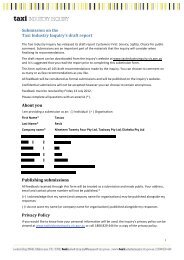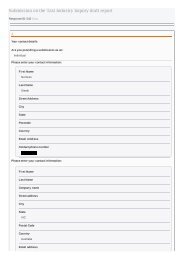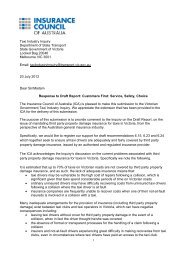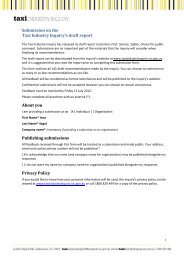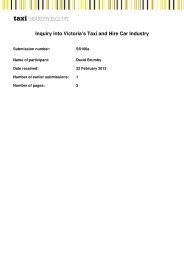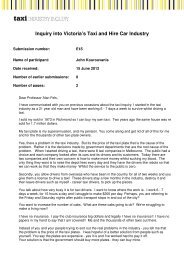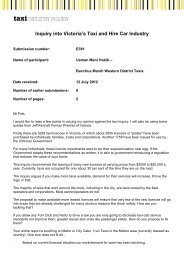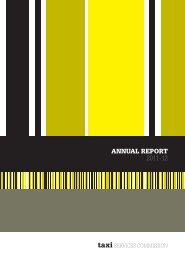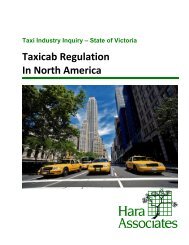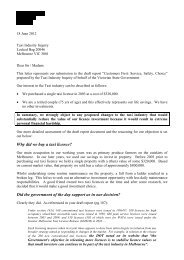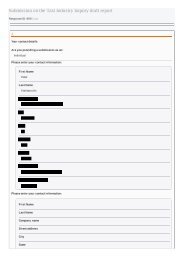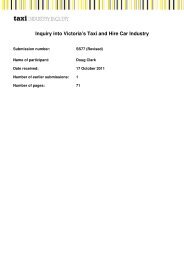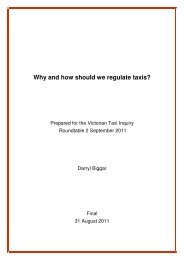Part D â Understanding and improving industry performance (PDF ...
Part D â Understanding and improving industry performance (PDF ...
Part D â Understanding and improving industry performance (PDF ...
Create successful ePaper yourself
Turn your PDF publications into a flip-book with our unique Google optimized e-Paper software.
Driver knowledge<br />
• Geography<br />
• General<br />
Vehicle condition<br />
• Cleanliness<br />
• Safety<br />
Driver behaviour<br />
• Unsafe/illegal driving practices<br />
• Refusing passenger directions<br />
• Not taking the most direct route<br />
• Rude behaviour<br />
• Refusal to assist passenger<br />
• Refusal to carry assistance animal<br />
• Assault – verbal or physical<br />
• Not running the meter/ negotiating price with<br />
passenger outside of contracted arrangement<br />
• Not logged on to electronic payment system<br />
• Running at higher tariff rate<br />
• Not complying with legislation or licence conditions<br />
The inquiry expects that this exercise will eventually not<br />
only lead to a clarification of responsibilities, but it will<br />
also be the basis for a more substantive rationalisation of<br />
regulatory instruments. This would entail consideration<br />
of the legislative provisions, accreditation provisions <strong>and</strong><br />
conditions, <strong>and</strong> the Business <strong>and</strong> Service St<strong>and</strong>ards<br />
affecting NSPs. This would potentially result in both a<br />
more effective regulatory framework <strong>and</strong> also one that<br />
significantly reduced regulatory burdens on the NSPs.<br />
Inquiry findings<br />
è The existing regulatory framework places a<br />
high degree of emphasis on taxi operators<br />
<strong>and</strong> drivers for delivering quality services,<br />
<strong>and</strong> very little emphasis on networks. The<br />
framework relies on prescriptive government<br />
regulation <strong>and</strong> the compliance activities of the<br />
regulator to achieve quality services. Market<br />
driven regulation <strong>and</strong> <strong>industry</strong> self-regulation<br />
are under utilised, despite being well placed<br />
to deliver efficient outcomes that meet<br />
community <strong>and</strong> <strong>industry</strong> expectations.<br />
è There is large scope to rationalise existing<br />
regulation relating to NSPs to more<br />
clearly define the role of NSPs in service<br />
<strong>performance</strong> <strong>and</strong> to remove unnecessary<br />
regulatory burdens.<br />
11.5. Performance issues<br />
11.5.1. Ability to deliver guaranteed<br />
service/advanced bookings<br />
As noted previously, many taxi users are mystified as to<br />
why the NSPs cannot guarantee a service will arrive on<br />
time (or at all) when it has been booked hours in advance<br />
or is a regular daily or weekly booking.<br />
NSPs have argued for some time that they are not<br />
empowered to direct affiliated operators to perform a<br />
booked job. The inquiry has not been provided with a<br />
specific reference to a regulation that may give effect<br />
to this restriction <strong>and</strong> has not been able to locate any<br />
statutory restriction on this practice. Rather, it seems that<br />
the reluctance to direct drivers is a discretionary one:<br />
The driver is free to accept or reject bookings offered<br />
to the driver by the Network <strong>and</strong> applicable to the<br />
class or type or taxi-cab at the time of offer driven by<br />
the driver. 44<br />
In 2004, Silver Top Taxis was the subject of litigation<br />
that sought to find that they had discriminated against<br />
wheelchair passengers by providing a different service<br />
to those passengers. 45 While the case was dismissed,<br />
Federal Magistrate Walters did make some pointed<br />
comments regarding the service provided to<br />
wheelchair passengers:<br />
One of the main thrusts of Silver Top’s argument<br />
was that it is unable to compel taxi operators to<br />
accept or prioritise a booking. The fact of the matter<br />
is, however, that for the reasons explained by Mr<br />
Franet (from Silver Top), it elects not to compel taxi<br />
operators to accept or prioritise bookings. That is<br />
so because it has chosen not to make the<br />
compliance by a taxi operator with the terms of<br />
his licence a real <strong>and</strong> enforceable condition of his<br />
affiliation with the depot. 46<br />
44 Silver Top Taxis Ltd, Owner <strong>and</strong> Driver H<strong>and</strong>book, supplied to the Taxi<br />
Industry Inquiry by the VTD, July 2008, p.13<br />
45 Walters FM, Federal Magistrates Court of Australia, Ball v Silver Top<br />
Taxi Service Ltd , December 2004, FMCA 967<br />
46 Ibid., p.39<br />
236



